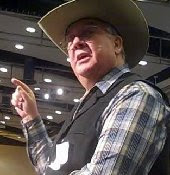By: Bob van der Valk
Dateline: Terry, Montana
November 7, 2010
In July 2010 BP Plc sold its Cushing, Oklahoma oil tanks, which they used as a major tool in controlling the price of West Texas Intermediate crude oil, to raise funds to pay for the Macondo well fire and oil spill disaster in the Gulf of Mexico.
They did lease back 7.8 million barrels of tank storage space at Cushing from the buyer Magellan Midstream Partners LP, which acquired the tanks as part of a larger $339 million transaction, including some of BP's existing oil inventories.
Cushing is the delivery point for the West Texas Intermediate (WTI) crude oil futures contract, the benchmark oil price in the Americas, and storage levels in the tanks have a major influence over the price of oil and fuel.
BP has been force as an oil trader and in the past has leveraged its space at Cushing for in having a trading advantage. They are still the only major oil company in the top three storage space holders with WTI crude oil inventories. The top two are pipeline companies leasing out space to commodities trading firms, in effect putting Wall Street bankers in control of the WTI crude oil price.
The imminent completion of the Keystone XL pipeline by TransCanada is going to increase Canadian crude oil exports and will end this landlocked crude oil storage facility from being a major factor in determining the world price for crude oil.
Instead, companies with access to the huge tank facilities at Cushing will be making their profits the old fashioned way by storing crude and committing it for sale later. The old fashioned “Buy low – sell high” principle will be back in full force.
The Cushing tank farm hold 36 million barrels of crude, which is just enough to supply U.S. oil demand for nearly two full days The 57 tanks BP sold have a capacity of 7.8 million barrels but operational constraints currently restrict usable capacity to 5.5 million barrels or 15% or the total capacity of the Cushing tank farm.
An additional 2 million barrels of storage is in the planning stages of being built anticipating the pipeline start up bringing in more Canadian oil imports in early 2013.
In June 2009 Attorney General Drew Edmondson sued BP for engaging in the unfair and deceptive practice of manipulating, and of attempting to manipulate, gasoline and crude oil prices in connection with the trading of energy futures on commodity trading markets.
He alleged that the manipulation took place from 2002 until present, through BP's "acquiring and hoarding short-term supplies of gasoline and crude oil".
Drew Edmondson retired this year after losing a run for the Oklahoma governorship in this year’s primaries. And BP may not recover financially enough from the expense of covering the damages and fines related to the Gulf oil spill for them to continue to be a market maker for crude oil pricing. What a difference a year makes in the crude oil trading business.
Monday, November 8, 2010
Subscribe to:
Post Comments (Atom)

No comments:
Post a Comment